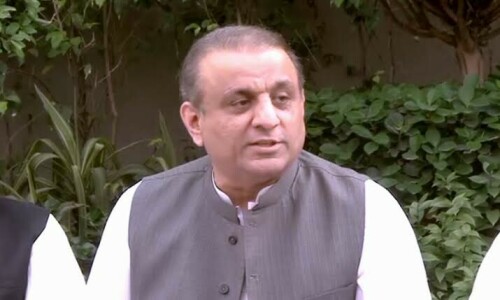
WASHINGTON: Pakistan has in recent years taken a number of steps to increase international confidence in the security of its nuclear arsenal, says a congressional report released on Wednesday.
In addition to overhauling nuclear command and control structures since September 11, 2001, Islamabad has implemented new personnel security programmes, the report notes.
Both “US and Pakistani officials continue to express confidence in controls over Pakistan’s nuclear weapons,” says the Congressional Research Service in the report it sent to Congress.
The report comes amid increased focus in the US on Pakistan’s nuclear programme with a senior lawmaker Ileana Ros-Lehtinen saying that all American aid to Pakistan should be conditioned to its commitment to non-proliferation.
Also on Wednesday, the US State Department released previously classified documents revealing that the United States and Britain launched a secret campaign in the late 1970s to stop Pakistan from acquiring material and technology for a nuclear bomb.
The documents released by the State Department show that as late as 1978, the US had hoped to prevent Pakistan from developing nuclear weapons although Islamabad’s nuclear programme was already in advanced stage by then.
Starting 1978, the US issued 300 demarches — formal diplomatic communication from one country to another — over the next three years to members of European, East Asian and West Asian government urging them to deny Pakistan access to sensitive technology.
The documents show that the US and Britain did have some success. For instance, they prevented France from constructing a plutonium reprocessing facility at Chashma, which Pakistan later completed on its own. To prevent a “particularly dangerous risk of nuclear proliferation,” the US state department asked each of the 12 member-countries of the Nuclear Suppliers Group to “exercise vigilance and appropriate control to deter” Pakistan.
According to the US Arms Control and Disarmament Agency, these efforts caused a two-year delay in the uranium enrichment programme. But Pakistan was not to be denied completely.
The congressional report, however, focuses on the current status of the Pakistani nuclear programme.
It quotes US and Pakistan officials as saying that since the 2004 revelations about a procurement network run by former Pakistani nuclear official A.Q. Khan, Islamabad has taken a number of steps to improve its nuclear security and to prevent further proliferation of nuclear related technologies and materials.
A number of important initiatives, such as strengthened export control laws, improved personnel security, and international nuclear security cooperation programmes “have improved Pakistan’s security situation in recent years,” says the US report.
“However, instability in Pakistan has called the extent and durability of these reforms into question. Some observers fear radical takeover of a government that possesses a nuclear bomb, or proliferation by radical sympathisers within Pakistan’s nuclear complex in case of a breakdown of controls,” the report warns.
The congressional report also addresses the link between Pakistan’s efforts to expand its programme to a nuclear deal the US singed with India three years ago.
“Whether and to what extent Pakistan’s current expansion of its nuclear weapon-related facilities is a response to the 2008 US-India nuclear cooperation agreement is unclear,” the report notes.
It points out that Islamabad does not have a public, detailed nuclear doctrine, but its “minimum credible deterrent” is widely regarded as designed to “dissuade India from taking military action against Pakistan.”













































